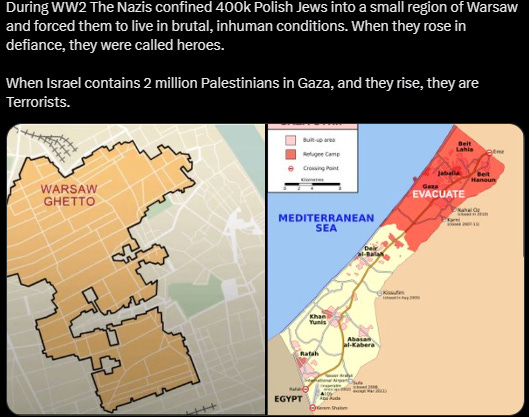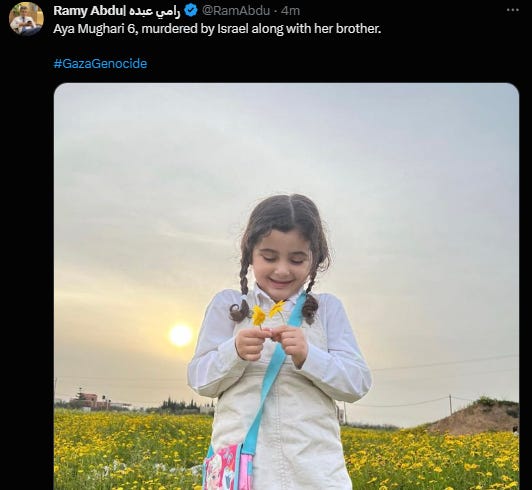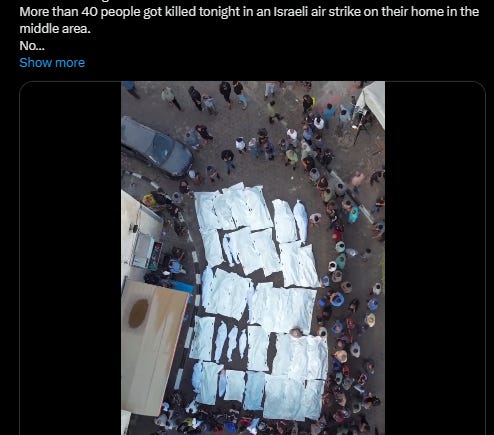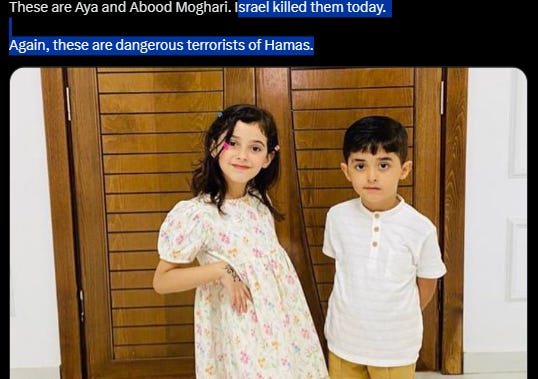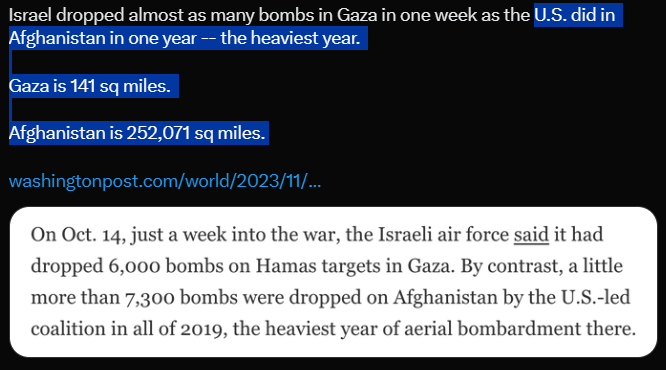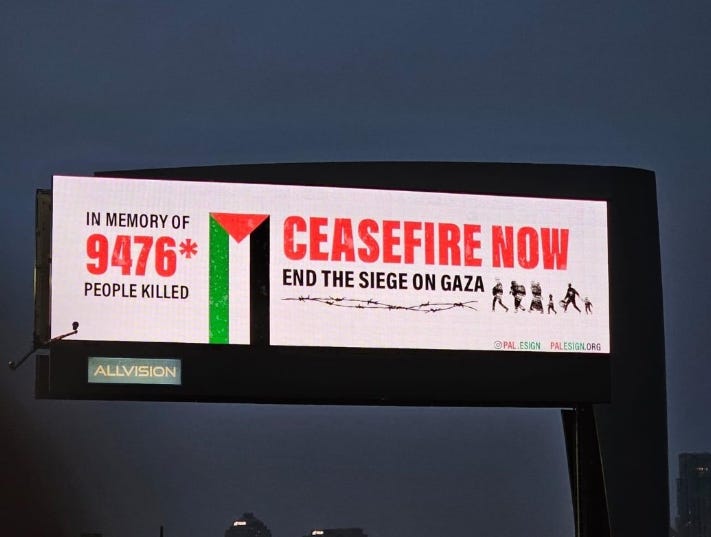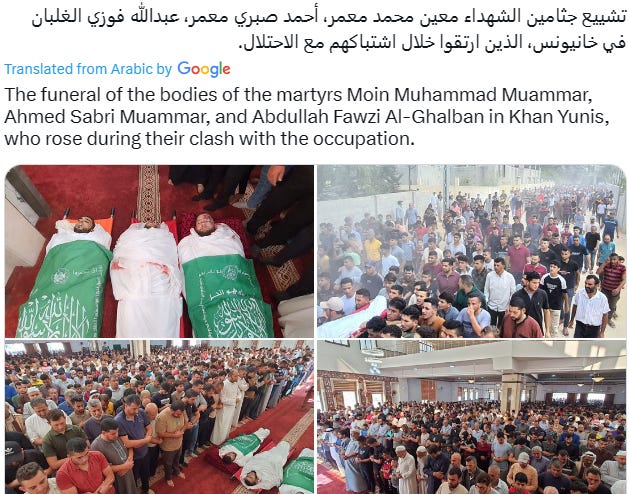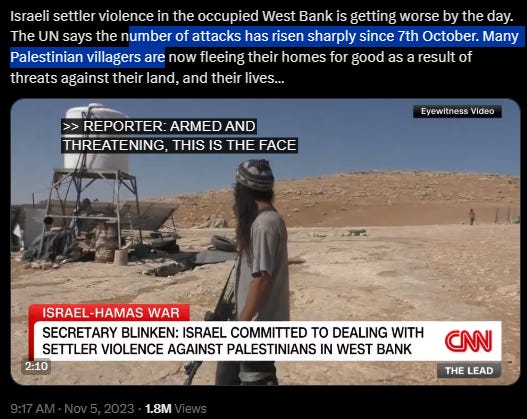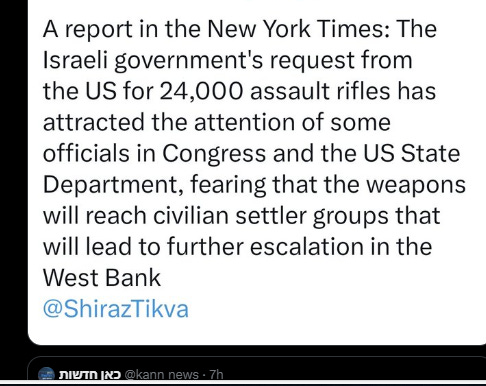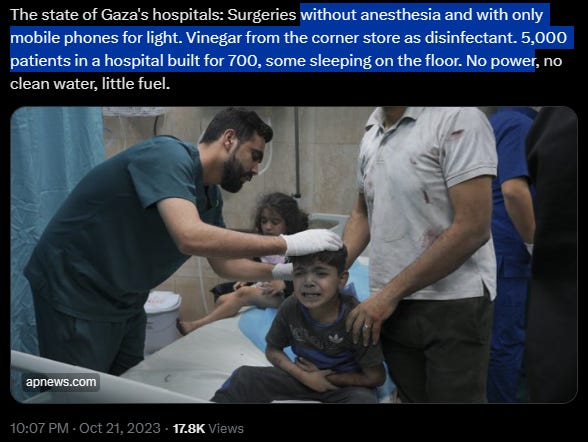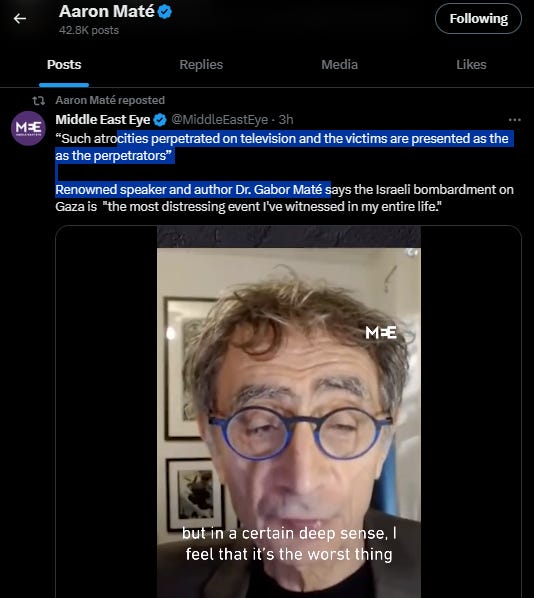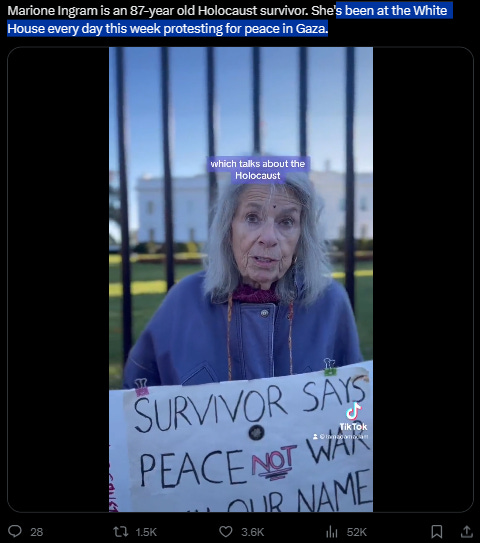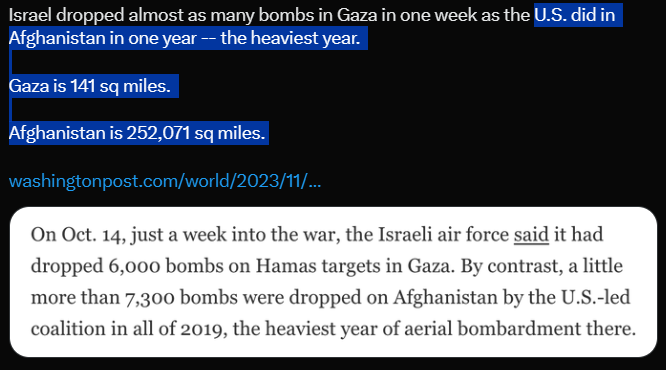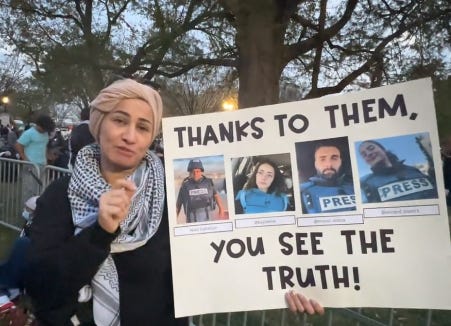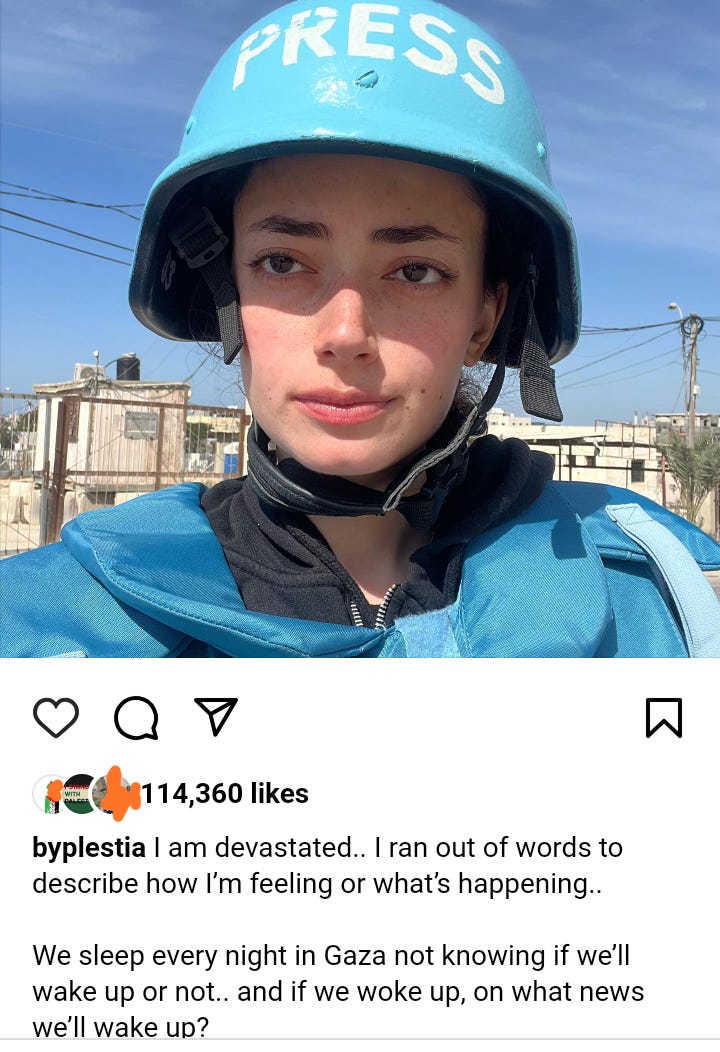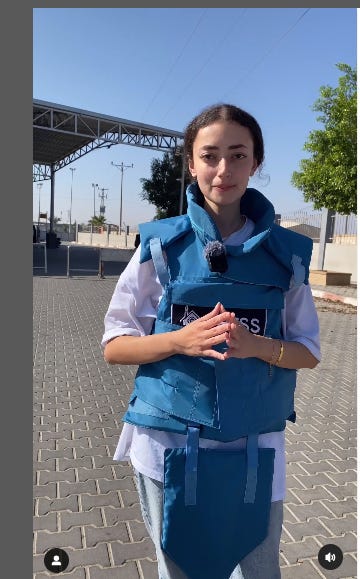Less Safe Israel
In no other conflict that I know of is it *so* clear that the extremists of both sides need each other, amplify each other, and cling to each other like desperate leeches.
Jerusalem, Gaza, Tel Aviv 3.58pm / DC 8.58am
The full range of soulless ghouls out there: “In a country where everyone serves in the army, there are no civilians.” Really? Including 5 year olds? “The Gazans should have rebelled against Hamas. They are all responsible.” Really? Including 5-year-olds?
No group has a monopoly on kindness or generosity. Humanity is everywhere. Some people have asked, "What would you do if you were in Netanyahu's place?" After thinking about this, here's what I would have done that horrible day: Nothing.
Nothing at all. Not one bullet—at least not for a while. "Israel will secure borders immediately. Hamas is in Gaza. They can't leave that place. They, and we, can wait a bit. Israeli will do this right." This would have been hard-to-impossible to pull off politically, but that's what leaders are for.
Responding to Hamas’ horrific killing of some 1,400 Israelis on Oct. 7, Israel has targeted the Gaza Strip with one of the most devastating military assaults of modern times. By day six, according to Middle East analyst Charles Lister, Israel had dropped more than twice as many bombs on this densely populated civilian area as the anti-Islamic State coalition dropped per month on an area 126 times as large.
By day nine, Israel had pummeled 2.2 million civilians with the equivalent of “a quarter of a nuclear bomb,” according to the Euro-Med Human Rights Monitor. By day 19, bombardment had destroyed or severely damaged at least 200,000 housing units or 45% of the housing stock in Gaza, leaving around 629,000 civilians to shelter in 150 U.N.-designated emergency shelters.
By day 23, Israel had killed more than 8,300 people, including 3,400 children, and injured 20,240, while another 1,800 remained missing or trapped under the rubble. Bombardment has been accompanied by Israel cutting off water, electricity, food, medicine and fuel — forms of collective punishment that are illegal under international law.
There is a long history of Israel’s use of collective punishment against Palestinian civilians, dehumanization and denial of Palestinian peoplehood and forced displacement as strategies of war. But there is another key factor shaping why, how and against whom Israel has used military force: what political scientists call “strategic culture,” or the engrained system of beliefs, values, assumptions, habits and institutionalized practices that shapes how states approach conflict.
The U.S. can condition aid when it wants. US people need to enforce more and stronger conditions, which already exist in US law. Weapons shouldn’t be going to anyone - civilians or soldiers - who violate human rights. srael assures U.S. new M16s won't go to West Bank settlers. Biden administration officials and members of Congress were concerned that the guns would be used for attacks against Palestinians. People defending Israel keep insisting that this is about Hamas and not ethnic cleansing. And Israel keeps doing ethnic cleansing in the West Bank, which is not controlled by Hamas.
made in US riffle, in hand
For the first 40 years of its statehood, Israel’s military doctrine was oriented to wars with other states. By the early 1990s, however, its main challenges were no longer conventional armies but nonstate actors. A shift in Israel’s thinking and behavior came to the fore with bombing campaigns on Lebanon in the 1990s and reprisals against the second Palestinian Intifada in the 2000s. A strategic culture crystallized that shifted from the use of military force to achieve specific on-the-ground objectives to, instead, intense concern about the appearance of weakness.
The first is a belief in the inherent rather than instrumental utility of military actions. A key pillar of Israel’s security doctrine has always been deterrence: the use or threat of force to convince adversaries not to challenge Israel because the costs will be high. Since the 1990s, Israel has increasingly adopted the logic that when its deterrence fails — as it did on Oct. 7 — even more overwhelming violence is needed to reestablish that deterrence. For decades, however, the effectiveness of extreme punitive responses has been more assumed than critically evaluated. Genuine exploration of nonmilitary options has all but disappeared. Pounding the enemy — “raining down hellfire,” as Prime Minister Benjamin Netanyahu expressed it last week — has become the solution to every problem. It is a goal in and of itself.
The second feature is justification of military reprisals on grounds that are moral as much as strategic. Israel’s belief that it is justified in using military might, even in violation of the international legal requirement of proportionality, is rooted in its historic sense of existential vulnerability and conviction that right is on its side in the fight against foes bent on its destruction.
While this belief in its own righteousness has long infused Israel’s strategic culture, it has taken on a more sweeping moralistic tone over time. Indeed, the rationale guiding military actions has increasingly shifted from the “logic of consequences” (rational action calculating expected returns from alternative choices) to the “logic of appropriateness” (whereby action seeks to fulfill social norms about what is good and proper). This comes to the fore in the current war, which Netanyahu has described as a fight of “good over evil, light over darkness.” Strategic utility is thus not the only, or perhaps even the primary, rationale for military force. Rather, Israel bombards the enemy because it claims that it is justified in doing so.
A third feature of Israeli strategic culture is a lack of nuance or differentiation in the targets of military force. In principle, the Israeli army endorses the notion of “tailoring” deterrence policies to address specific circumstances. In practice, however, Israel has increasingly turned to blanket, indiscriminate and brute force without meaningful attention to context, root causes or the real drivers of conflict.
For more than a decade, this has been on display in recurrent shows of overwhelming military strength in Gaza that security elites refer to as “mowing the grass.” The metaphor is telling. Grass has neither feelings nor intelligence.
As long as grass is alive, it is destined to grow; the only thing that can limit its growth is periodically taking a blade to shorten it. In using this analogy, Israel’s security establishment suggests that its enemies are similarly undeterrable and their belligerence inevitable. It does not seriously consider their motivations or the possibility that they may respond to incentives other than violence.
The current siege of Gaza has shifted from mowing grass to uprooting it entirely. Indeed, Defense Minister Yoav Gallant’s declaration that Israel is “fighting human animals” points to an even more startling biological metaphor. It not only casts all of Gaza as a fair target, but also deploys dehumanizing rhetoric of the kind that scholars have long recognized as genocidal.
In the history that we examined in our book, these three elements came to a climax in the “Dahiyah Doctrine.” Named after Israel’s crushing of the Dahiyah suburb of Beirut during its stalemated 2006 war with Hezbollah, this concept endorses overwhelming and disproportionate use of force to punish and deter attackers, as well as destruction of government and civilian infrastructure. As Maj. Gen. Gadi Eisenkott described the model:
What happened in the Dahiya quarter … will happen in every village from which Israel is fired on. … We will apply disproportionate force on it and cause great damage and destruction there. From our standpoint, these are not civilian villages, they are military bases.
The current bombardment of villages, towns, hospitals, telecommunications and other pillars of civilian life in Gaza is the “Dahiyah Doctrine” intensified to a previously unimaginable degree. Fueled by a strategic culture that invokes moralistic justifications for extreme, undifferentiated military force as an end in itself, Israel’s current punitive campaign is of dubious security utility. Israel has carried out four devastating wars against Gaza, in 2009, 2012, 2014 and 2021, with the aim of deterring or defeating Hamas. But during these years Hamas has only grown more sophisticated in its capacities and more brazen in its efforts, as the Oct. 7 attack demonstrated. Even if Israel now succeeds in destroying Hamas as an organization, it risks strengthening Hamas as an ideology and expression of Palestinians’ resolve to fight occupation and subjugation.
The only achievement of Israel’s prior assaults on Gaza, to say nothing of the 16-year blockade that the U.N. has judged as making the enclave “unlivable,” is unspeakable suffering for millions of Palestinian civilians and the inevitable recurrence of another war. The same is the case today. Bombardment, siege, forced displacement and the denial of humanitarian access might satisfy the desire for revenge, but these actions cannot bring Israelis security. As long as self-determination is denied, Palestinian resistance will continue, be it in ever-more deadly forms of violence heralded by Hamas’ latest attack or in the myriad nonviolent forms that Palestinians have also undertaken for over a century.
There is no military solution to the irreducibly political problem of two peoples seeking to live with freedom and dignity on the same small piece of land. Security requires peace, which can only be obtained through a meaningful negotiations process grounded in respect for international law and the human rights of all peoples.
I know a lot of high-ranking media, such as New York Times, Guardian, Anadolu, BILD, Spiegel, Financial Times, Strait Times, Washington Post etc subscribed my substack. Plestia ‘Bosbos’ Alaqad ready to be your Stringer inside Gaza under bombing by Israel. Plestiaa2011@gmail.com
Toddler with Plestia, before war, living in Northern Gaza and they evacuated to Southern Gaza. Since Friday, Oct 13, when Israel announced to every Gazans from northern move to southern, more than 5,000 killed in southern, not counting barbaric bombing in northern Gaza. Northern Gaza is being depopulated, while even residents in the south are ordered to evacuate as the israelis implement their ethnic cleansing. Refugee literally fulfilled Israel warning, and still killed with barbaric bombing by Israel. Documentation by Plestia Alaqad




